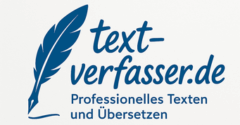The translation agency for projects in English and German
An English-German translator is a language expert specializing in transferring content between the English source language and the German target language. These professionals play a crucial role in a globalized world where communication between different cultures and countries is of great importance.
The Work of an English-German Translator
The task of an German translator involves translating written texts, documents, audio or video files, websites, and other materials from one language to English or vice versa. It is crucial to understand not only the language but also the cultural nuances and subtleties of both languages to ensure accurate and natural translation.
This work requires a variety of skills and qualities from the German translator. First and foremost, the translator must naturally possess a comprehensive command of both the English and German languages. This includes excellent knowledge of grammar, vocabulary, expressions, and idiomatic phrases. Furthermore, the translator should also be a skilled writer, as the new document should also be fluently readable to ensure a clear and understandable translation.
In the digital world, the activity is closely tied to excellent research skills. Translators are often confronted with technical, legal, medical, or other specialized subjects, requiring thorough research to use the correct terminology.
The use of modern translation tools and technologies is essential for translators working between the English and German language combination. Computer-assisted translation tools (CAT tools) and automated databases enable efficient management of translation projects, reuse of translations, and ensuring consistency in extensive documents.
It is important to emphasize that translation is not merely a mechanical transfer of words but a creative activity. A good English-German translator is capable of maintaining the tone, style, and intended meaning of the original text in the translation to appropriately convey the author’s intended message.
What Texts Are Translated by an German Translator?
- Business documents such as business reports, contracts, business correspondence, marketing materials, presentations, and company websites.
- Technical texts such as user manuals, technical specifications, manuals, engineering documentation, and product descriptions.
- Legal texts such as court documents, judgments, legal contracts, patent applications, and legal opinions.
- Medical texts such as medical articles, patient records, medical reports, medication information, and medical studies.
- Literary texts such as English-German translation of fiction, poetry, short stories, and other literary works.
- Academic documents such as scientific articles, research papers, dissertations, and academic lectures.
- Websites and software: Translation of web content, apps, and software from English to German and vice versa.
- Texts for tourism and hospitality, such as travel guides, hotel reviews, tourist information, and promotional materials for the tourism industry.
- Advertising and marketing texts such as advertising slogans, advertising messages, brochures, and marketing campaigns.
Conclusion
The task that a professional English-German translator must tackle nowadays is certainly diverse. Some translators work freelance and take orders from clients in various industries, while others are employed by translation agencies or companies. Translators of this language pair are also needed in international organizations, government agencies, or the publishing industry.
